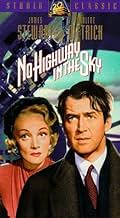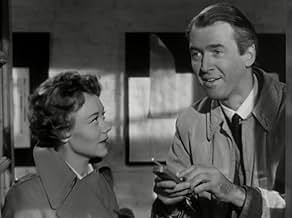Ajouter une intrigue dans votre langueAn aeronautical engineer predicts that a new model of airplane will fail catastrophically and in a novel manner after a specific number of flying hours due to metal fatigue.An aeronautical engineer predicts that a new model of airplane will fail catastrophically and in a novel manner after a specific number of flying hours due to metal fatigue.An aeronautical engineer predicts that a new model of airplane will fail catastrophically and in a novel manner after a specific number of flying hours due to metal fatigue.
- Réalisation
- Scénario
- Casting principal
- Récompenses
- 2 victoires au total
- Second Engineer
- (non crédité)
- Flight Officer
- (non crédité)
- Sir Philip
- (non crédité)
- Farnborough Director
- (non crédité)
- Rosie - Barmaid
- (non crédité)
- Plane Passenger
- (non crédité)
- Inquiry Board Member
- (non crédité)
- Johnson - Director's Secretary
- (non crédité)
- Maj. Pearl
- (non crédité)
- Autograph Hunter
- (non crédité)
Avis à la une
The problem is that Mr Honey is a bit of a recluse and eccentric, a widower and single parent, and considered a bit of an odd duck by his contemporaries. However, he has credentials and his work is taken seriously enough to allow him to convince his employers to conduct the structural design lab tests, even though they do not really take him seriously on his metal fatigue theories and for the most part seem to be simply patronizing him... ...until Honey finds himself traveling via air and the airplane he gets onto happens to be a Reindeer... with enough acquired flight hours on the airframe to be dangerously close to the failure point according to his calculations. Honey, upon realizing that the airplane has the "required" flight time on the clocks to be in danger, embarks upon a quest to do something about it as only an eccentric genius can, and the story takes off from there (again, no pun).
The combination of a laid-back American actor like James Stewart and a somewhat abrupt British cast tends to accentuate Stewart's Theodore Honey, a normally reserved but very absorbed engineer caught up in his work, surrounded by a pack of hustle and bustle Brits. It's quite a contrast. Good support from Glynis Johns as the stewardess aboard the Reindeer and Marlene Dietrich as movie star Monica Teasdale, also a passenger aboard the airplane, both of whom get caught up in Honey's apprehension and fears of an impending disaster that he is certain is staring them in the face, although nobody else really takes any of it seriously... until Honey takes matters into his own hands after the airplane lands without incident and he learns that it's scheduled to remain in service in spite of his rather uncharacteristically loud and spirited pleas to have it grounded. His solution to keeping the airplane grounded until his lab tests are concluded is certainly an interesting turn of events.
Considering the vintage of this film (1951) it has decent F/X and remains a bit of a period piece, demonstrating how air travel used to be done before mass transport Jumbo Jets and economy class seating. This film is an aviation enthusiasts sort of movie as well as a story of the little guy who believed in his convictions and the few people around him who believed in him as a person... even though they may have doubts about his work and his theories.
Good cast across the board, with some standouts like Jack Hawkins who is always fine, and Marlene Dietrich who at first seems to be there solely as Star Appeal although after a bit of time passes, her presence becomes more and more genuine. There is some good character development in this film, albeit sometimes a bit rushed and the ending is also rather abrupt... but typical of many British films of the period. All and all, it's a film well worth watching for the fine performances and the engrossing story... and as a sidenote, for the look back at the way the fledgling airline industry and how it was coming into its own.
It also inadvertently provides a sobering point to ponder since this film was produced several years before the British De Haviland Comet jet airliner entered service and disastrously became aviation's first great example of the potential for a catastrophic structural failure caused by a design fault, which although corrected quickly, still didn't save the airliner from the stigma it suffered when several crashed after they experienced explosive decompression at high altitude from something as simple as having cabin windows too large and the wrong shape.
The British airline industry must have collectively flashed back to this film during the mid-1950s and the Comet's woes, and how prophetic "No Highway In The Sky" must have seemed at the time.
This film also includes some considerable supporting talent, almost all of which went uncredited, such as Kenneth More and Wilfrid Hyde-White.
His real name was Nevil Shute Norway. He is remembered for his writing, in particular the novels A TOWN NAMED ALICE and ON THE BEACH. But he was also an aviation engineer. Working for Vickers, he helped design all types of aircraft. In particular, he helped in the building of the zeppelin R-100 which Vickers designed in a contest between private industry and the government. A Labor government in office was trying to demonstrate the superiority of government sponsored projects over private industry. The R-100 proved a perfectly adequate zeppelin, that did a maiden trip to and from Canada safely. The government sponsored R-101 crashed on its first voyage in France, and killed 44 out of 48 men on board, including the Secretary of State for Air, Lord Thomson (who had pushed the project) and most of the government's aviation experts. Shute wrote a very good account of his career as an engineer, and of the R-101 Tragedy, entitled SLIDE-RULE. I recommend reading it if you ever get a chance. It helps explain the experience he brought to the writing of NO HIGHWAY.
However, beyond a review of the comforts of flying during the mid-20th century, Henry Koster's "No Highway in the Sky" is a decent little drama, highlighted by an impassioned performance by James Stewart. Set in England, Stewart is Theodore Honey, a scientist in an aircraft design and testing lab, who is studying the propensity of the tail wings on Reindeer aircraft to self destruct after about 1400 hours of flying. As the widowed scientist, Stewart is gangly, clumsy, and socially awkward; absent minded to the point of forgetting where he lives, he is focused completely on science and the problem at hand and largely dismisses other people. In a household cluttered with books, Stewart lives with his intelligent school-age daughter, whom he has isolated from other children. Perhaps overshadowed by his work in "It's a Wonderful Life" and "Harvey" during the same period, Stewart is nevertheless excellent in the part, and his speech to the aircraft committee has elements of his passionate "Mr. Smith Goes to Washington" rouser.
Although the personal aspects of the story are unconvincing, the screenplay by R. C. Sheriff, Oscar Millard, and Alex Coppel, which was based on a novel by Nevil Shute, does throw light on the aviation industry in Britain just after World War II. Pushed to prove his hypothesis, Stewart is sent to Labrador to find the missing tail of a recently crashed Reindeer. Unfortunately, he finds himself aboard a similar Reindeer that is nearing the critical point when he projects that the tail will disintegrate. The drama aboard the tense overseas flight involves Marlene Dietrich as Monica Teasdale, a glamorous film star; a touching Glynis Johns as Marjorie, a sympathetic stewardess; and Kenneth Moore as the co-pilot. Dietrich and Stewart, who were previously paired in "Destry Rides Again," work especially well together. Jack Hawkins appears as Scott, a new department manager, and Wilfred Hyde White makes a brief appearance as a researcher.
While uneven and unconvincing at times, "No Highway in the Sky" offers a priceless look at air travel more than half a century ago, a fine James Stewart performance, and the timeless beauty of Marlene Dietrich. Actually, Stewart's often befuddled Theodore Honey alone is reason enough to catch the film.
vehicle around which unforgettable characters revolve. James Stewart is
simply wonderful as Mr. Honey, and Marlene Dietrich shines, and grows, as
"star" Monica Teasdale. An enduring film masterpiece for thoughtful adults.
The supporting actors are first rate: the daughter was surprising believable, the wonderful Glynis Johns in her usual dream performance. I rate it 9 out of 10, as these films will not happen soon again. Thoughtful dramas about flight and aeronautics abounded in the late 40's and 50's -- I recommend the British entry "The Night my Number Came Up" -- and should be studied and regarded by
serious film devotees.
Le saviez-vous
- AnecdotesMarlene Dietrich chose her wardrobe from the newest Christian Dior collection and charged it to the studio. She decided that the fur stole they had wasn't ample enough for her character so she threw on a mink cape and used the stole as a collar piece to get the luxurious look she wanted.
- GaffesAt Gander Airport in Newfoundland, the pilot refuses to allow Honey back on the plane to continue to Montreal, whilst Miss Corder tells him they'll see him in Montreal, but since Honey was on his way to Labrador, which was part of Newfoundland, to investigate the previous Reindeer crash, he would have been leaving the plane at Gander and not going on to Montreal in the first place.
- Citations
Elspeth Honey: it's very hard being a scientist. One has to think a great deal. The world would have made scarcely any progress at all if it hadn't been for scientists.
Dennis Scott: I see. The scientists do the thinking for the world, and the rest of us just live in it, is that it?
Elspeth Honey: Yes.
- ConnexionsFeatured in Boom! Hollywood's Greatest Disaster Movies (2000)
Meilleurs choix
- How long is No Highway in the Sky?Alimenté par Alexa
- On what book was the story based?
Détails
- Date de sortie
- Pays d’origine
- Langue
- Aussi connu sous le nom de
- En el cielo no hay caminos
- Lieux de tournage
- Société de production
- Voir plus de crédits d'entreprise sur IMDbPro
Box-office
- Montant brut aux États-Unis et au Canada
- 2 507 000 $US
- Durée1 heure 39 minutes
- Couleur
- Rapport de forme
- 1.37 : 1
Contribuer à cette page
































